
JOURNAL OF PLANT PATHOLOGY
Scope & Guideline
Illuminating the Pathways of Plant Health
Introduction
Aims and Scopes
- Plant Disease Identification and Characterization:
The journal emphasizes the identification and characterization of plant pathogens using morphological, molecular, and genetic techniques. This includes studies on a wide range of pathogens affecting various crops globally. - Pathogen Biology and Ecology:
Research articles often explore the biology, ecology, and epidemiology of plant pathogens, shedding light on their life cycles, transmission mechanisms, and environmental influences on disease spread. - Resistance Mechanisms and Breeding:
The journal highlights research on plant resistance mechanisms to pathogens and the breeding of resistant plant varieties, contributing to sustainable agricultural practices and enhancing crop resilience. - Management Strategies for Plant Diseases:
It publishes studies on integrated disease management strategies, including the use of chemical, biological, and cultural practices to control plant diseases, emphasizing sustainable approaches. - Impact of Climate Change on Plant Pathology:
The journal addresses how climate change affects plant health and disease dynamics, providing insights into future challenges for agriculture in a changing environment.
Trending and Emerging
- Molecular and Genomic Approaches:
There is a significant increase in the use of molecular and genomic techniques for studying plant pathogens, enabling researchers to explore pathogen diversity, resistance mechanisms, and interactions with hosts at a deeper level. - Biocontrol and Sustainable Practices:
Research focused on biological control agents and sustainable agricultural practices is trending upward, reflecting a shift towards environmentally friendly disease management solutions. - Impact of Climate Change on Plant Diseases:
As climate change continues to affect agriculture, studies examining its impact on plant diseases and pathogen dynamics have gained prominence, highlighting the need for adaptive management strategies. - Artificial Intelligence and Machine Learning Applications:
The incorporation of artificial intelligence and machine learning for disease prediction and management is emerging as a significant theme, showcasing the potential of technology in enhancing plant health monitoring. - Plant Microbiome Research:
An increasing focus on the plant microbiome and its role in plant health is evident, with studies exploring how microbial communities can influence disease resistance and plant growth.
Declining or Waning
- Traditional Chemical Control Methods:
There is a noticeable decline in research focused solely on traditional chemical control methods for plant diseases, as the field shifts towards integrated pest management strategies that emphasize sustainability and reduced chemical use. - Non-Molecular Diagnostic Techniques:
The frequency of studies utilizing solely traditional diagnostic techniques (e.g., morphological identification) has decreased, with a growing preference for molecular techniques that provide more accurate and rapid results. - Herbicide Resistance Studies:
Research specifically centered on herbicide resistance in plant pathogens has waned, as the journal's focus has shifted towards more holistic disease management approaches that integrate multiple strategies. - Pathogen Surveillance in Limited Regions:
There has been a decline in studies that focus exclusively on pathogen surveillance in localized regions, with a broader interest in global patterns and impacts of pathogen spread.
Similar Journals
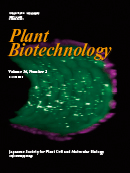
Plant Biotechnology
Shaping the Future of Crop Innovation.Plant Biotechnology is a distinguished journal published by the Japanese Society for Plant Cell and Molecular Biology, committed to advancing the field of plant biotechnology through the dissemination of high-quality research. With an ISSN of 1342-4580, this journal caters to a global audience interested in agronomy, crop science, and plant molecular biology. The journal has achieved notable rankings, including Q2 in Agronomy and Crop Science and Q2 in Plant Science, underscoring its relevance and impact in these fields according to the latest 2023 metrics. Furthermore, it holds a respectable position within Scopus rankings across multiple categories, indicating its contribution to the academic community. Although it is not an open-access journal, its regular publications, spanning from 1997 to 2024, feature cutting-edge studies that explore innovative approaches and technologies in plant science. Researchers, professionals, and students will find Plant Biotechnology an essential resource for staying informed on significant advancements and trends in plant research.
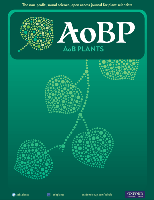
AoB Plants
Leading the way in plant science advancements.AoB Plants is a distinguished open-access journal published by Oxford University Press, dedicated to advancing the field of plant science. Since its inception in 2009, this journal has played a pivotal role in disseminating high-quality research that encompasses a wide range of topics including plant biology, ecology, and biotechnology. With an impressive impact factor and a ranking in the Q1 quartile for Plant Science, AoB Plants is recognized for its innovative contributions and scholarly rigor, ranking #129 out of 516 in the Scopus Agricultural and Biological Sciences category, placing it in the 75th percentile among its peers. By promoting open-access availability of research findings, the journal empowers researchers and practitioners alike, facilitating greater collaboration and knowledge sharing in the global scientific community. Situated in the heart of the United Kingdom, AoB Plants continues its commitment to providing a platform for pioneering research and developments in plant science, thus fostering a deeper understanding of the crucial roles that plants play in our ecosystems and economies.
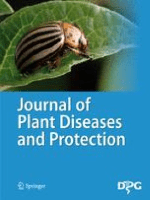
Journal of Plant Diseases and Protection
Unveiling Solutions for Plant ProtectionThe Journal of Plant Diseases and Protection, published by SPRINGER HEIDELBERG in Germany, is a premier platform for the dissemination of cutting-edge research in the fields of Agronomy, Horticulture, and Plant Science. With its Q2 ranking in multiple categories as of 2023, this journal stands out in the academic landscape, highlighting its strong performance with a notable Scopus rank of 22nd in Horticulture and placing in the top percentile for Agronomy and Plant Science. The journal spans from 2006 to 2024, making it a valuable resource for researchers, professionals, and students seeking to stay abreast of advancements in the understanding of plant diseases and their protection. The Open Access options further enhance its accessibility, fostering a global exchange of knowledge essential for addressing contemporary agricultural challenges.

AUSTRALASIAN PLANT PATHOLOGY
Advancing the science of plant health in Australasia.Australasian Plant Pathology, published by Springer, is a leading journal in the field of plant science that focuses on the study of plant diseases and their management across the Australasian region. With an established history since 1978, the journal aims to provide a platform for high-quality research that enhances our understanding of plant pathology, prevention strategies, and sustainable management practices. With an impact factor that reflects its significance in the scientific community and its Q3 quartile ranking in 2023 among plant science journals, it serves as a vital resource for researchers, professionals, and students alike. Although it does not have Open Access options, the journal ensures that its content, which spans a wide spectrum of plant pathology topics, remains accessible to a diverse audience globally. With a commitment to advancing knowledge in this crucial area of study, Australasian Plant Pathology continues to play an essential role in addressing the challenges posed by plant diseases in a changing environment.

Plant Science Today
Cultivating insights in the world of plant biology.Plant Science Today is a prominent journal dedicated to advancing the field of plant sciences through innovative research and comprehensive reviews. Published by HORIZON E-PUBLISHING GROUP in India, this open-access journal has been actively disseminating knowledge since its inception in 2018, with a convergence period extending to 2024. With an ISSN of 2348-1900 and a growing reputation, it is categorized in various quartiles for 2023, notably achieving Q3 in Biochemistry, Genetics and Molecular Biology (miscellaneous), while it holds Q4 rankings in critical fields including Ecology and Plant Science. As a valuable resource for students, researchers, and professionals, Plant Science Today aims to inspire discussion and innovation in the realm of ecological and plant science disciplines, where it currently ranks within the lower percentiles in prominent categories such as Environmental Science and Agricultural and Biological Sciences. The journal serves as a crucial platform for the exploration of experimental and theoretical advances, fostering a community eager to explore plant biology's complexities.

JOURNAL OF GENERAL PLANT PATHOLOGY
Empowering Researchers with Cutting-Edge FindingsJOURNAL OF GENERAL PLANT PATHOLOGY, published by SPRINGER JAPAN KK, is a pivotal platform dedicated to the dissemination of high-quality research in the fields of agronomy and crop science, as well as plant pathology. With an ISSN of 1345-2630 and an E-ISSN of 1610-739X, this journal plays a significant role in advancing our understanding of plant diseases and their management, particularly within the context of sustainable agriculture. Currently ranking in the Q3 quartile for both Agronomy and Crop Science as well as Plant Science, it showcases a diverse array of articles that encompass fundamental research, innovative methodologies, and practical applications to address contemporary challenges in these fields. Researchers and professionals seeking to enhance their knowledge and stay abreast of the latest findings will find the JOURNAL OF GENERAL PLANT PATHOLOGY an invaluable resource. Operating without Open Access, it still ensures wide accessibility through institutional subscriptions and comprehensive digital archiving, with a commitment to excellence from its inception in 2001 through its ongoing developments into 2024.
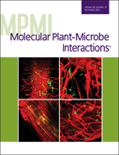
MOLECULAR PLANT-MICROBE INTERACTIONS
Exploring the Intricacies of Plant-Microbe DynamicsMOLECULAR PLANT-MICROBE INTERACTIONS is a premier journal dedicated to the exploration of the complex interactions between plants and microbes, providing a vital platform for researchers in agronomy, crop science, and plant physiology. Published by the American Phytopathological Society, this journal has been serving the academic community since 1988 and continues to be at the forefront of advances in molecular biology and plant-microbe symbiosis, with a notable impact factor reflecting its esteemed position in the field. As a Q1 journal in both Agronomy and Crop Science and Medicine (miscellaneous), and holding a significant ranking in the Scopus categories, it is recognized for publishing high-quality, peer-reviewed research that is essential for understanding and improving agricultural practices. Although it is not an open-access journal, it provides critical insights that facilitate collaborative efforts among researchers, professionals, and students alike. The journal’s objectives focus on enhancing our understanding of plant health, disease resistance, and ecological sustainability, making it a crucial resource for anyone interested in the intricate research landscape of plant-microbe dynamics.

Australasian Plant Disease Notes
Connecting Ideas to Combat Plant DiseasesAustralasian Plant Disease Notes is a vital resource in the fields of Agronomy and Plant Science, published by SPRINGER. Established to address the increasing need for research dissemination on plant diseases in the Australasian region, the journal focuses on the sharing of innovative findings and methodologies pertinent to plant health and pathology. With an ISSN of 1833-928X and E-ISSN 1833-928X, this journal serves as an open platform for researchers to contribute original research, case studies, and reviews that enhance our understanding of plant diseases. Recognized in the academic community, it achieved a Q3 ranking in both Agronomy and Plant Science categories as of 2023, indicating its relevance and significance in the field. The journal aims to support researchers, professionals, and students by providing access to critical insights that can drive advancements in agricultural practices and plant conservation efforts. With a convergence of knowledge spanning from 2009 to 2024, Australasian Plant Disease Notes is poised to make a lasting impact in the study of plant health.
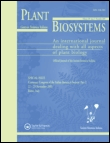
PLANT BIOSYSTEMS
Bridging Knowledge Gaps in Plant Biosystems ResearchPLANT BIOSYSTEMS, published by TAYLOR & FRANCIS LTD, is a leading academic journal dedicated to advancing the understanding of plant systems and their ecological interactions. With an ISSN of 1126-3504 and an E-ISSN of 1724-5575, this journal holds a significant place in the fields of Ecology and Plant Science, earning a Q2 rank in both categories as of 2023. Established in 1993 and continuing robustly through to 2024, it aims to provide a platform for pioneering research that encompasses a wide array of topics, from evolutionary biology to plant-environment interactions. Although not an open-access journal, it maintains a strong reputation, backed by its impressive Scopus rankings—positioned at #179 in Ecology, Evolution, Behavior and Systematics and #138 in Plant Science, placing it within the top percentiles. PLANT BIOSYSTEMS is a vital resource for researchers, professionals, and students who are keen to contribute to and learn from cutting-edge findings in the ever-evolving domain of plant sciences.
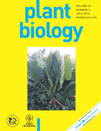
PLANT BIOLOGY
Pioneering Discoveries in Plant SciencePLANT BIOLOGY is a prestigious academic journal published by Wiley, dedicated to advancing knowledge in the fields of plant science, ecology, and evolutionary biology. With an impressive impact factor and ranking in the Q1 category for Ecology, Evolution, Behavior and Systematics, and Plant Science as of 2023, it stands at the forefront of research dissemination. The journal encompasses a broad scope of plant biology topics, providing a critical platform for researchers to share innovative findings and foster interdisciplinary collaboration. Available in both print (ISSN: 1435-8603) and online formats (E-ISSN: 1438-8677), it ensures accessibility through open access options. As a crucial resource for professionals, researchers, and students alike, PLANT BIOLOGY cultivates a deeper understanding of plant systems and their ecological significance, making it an essential addition to the library of anyone dedicated to the study of biology and the environment.